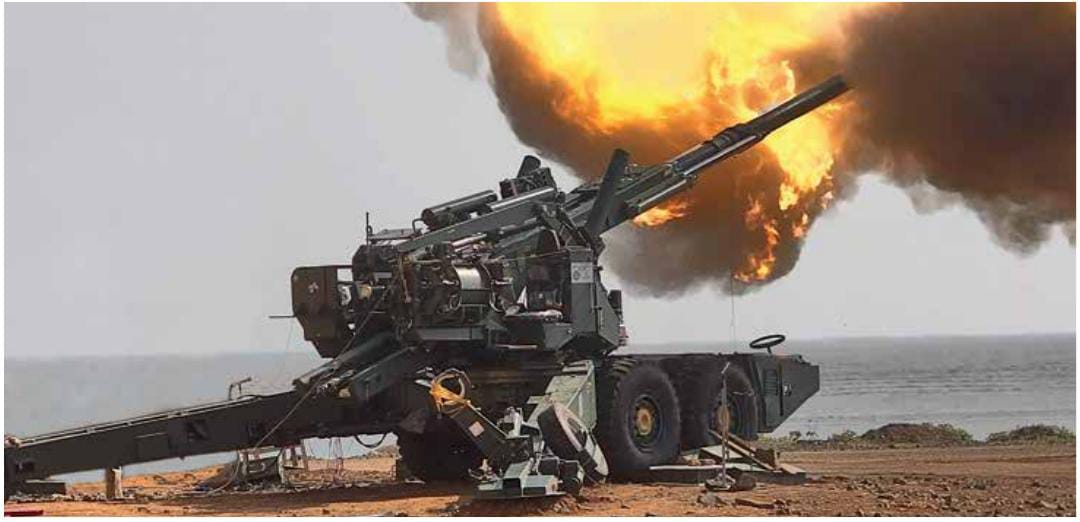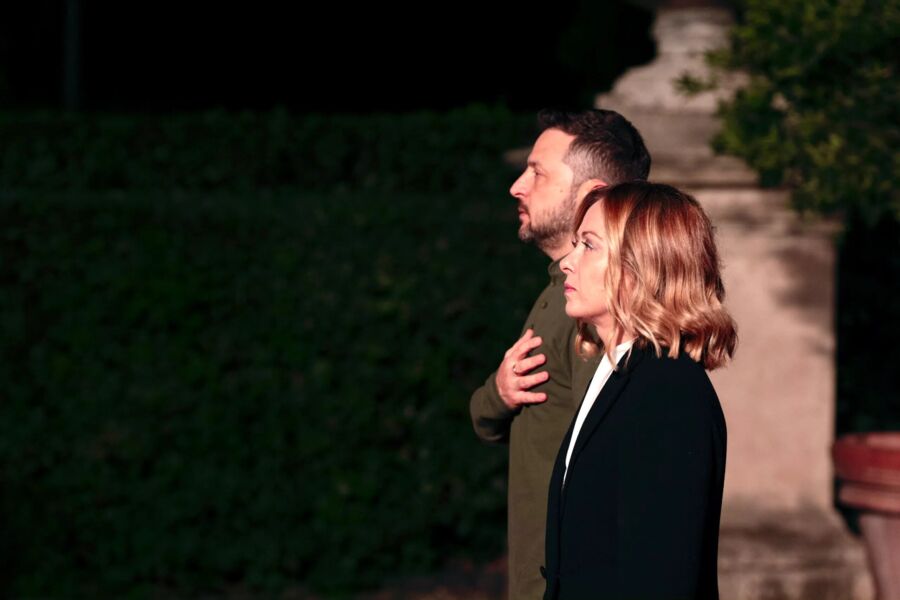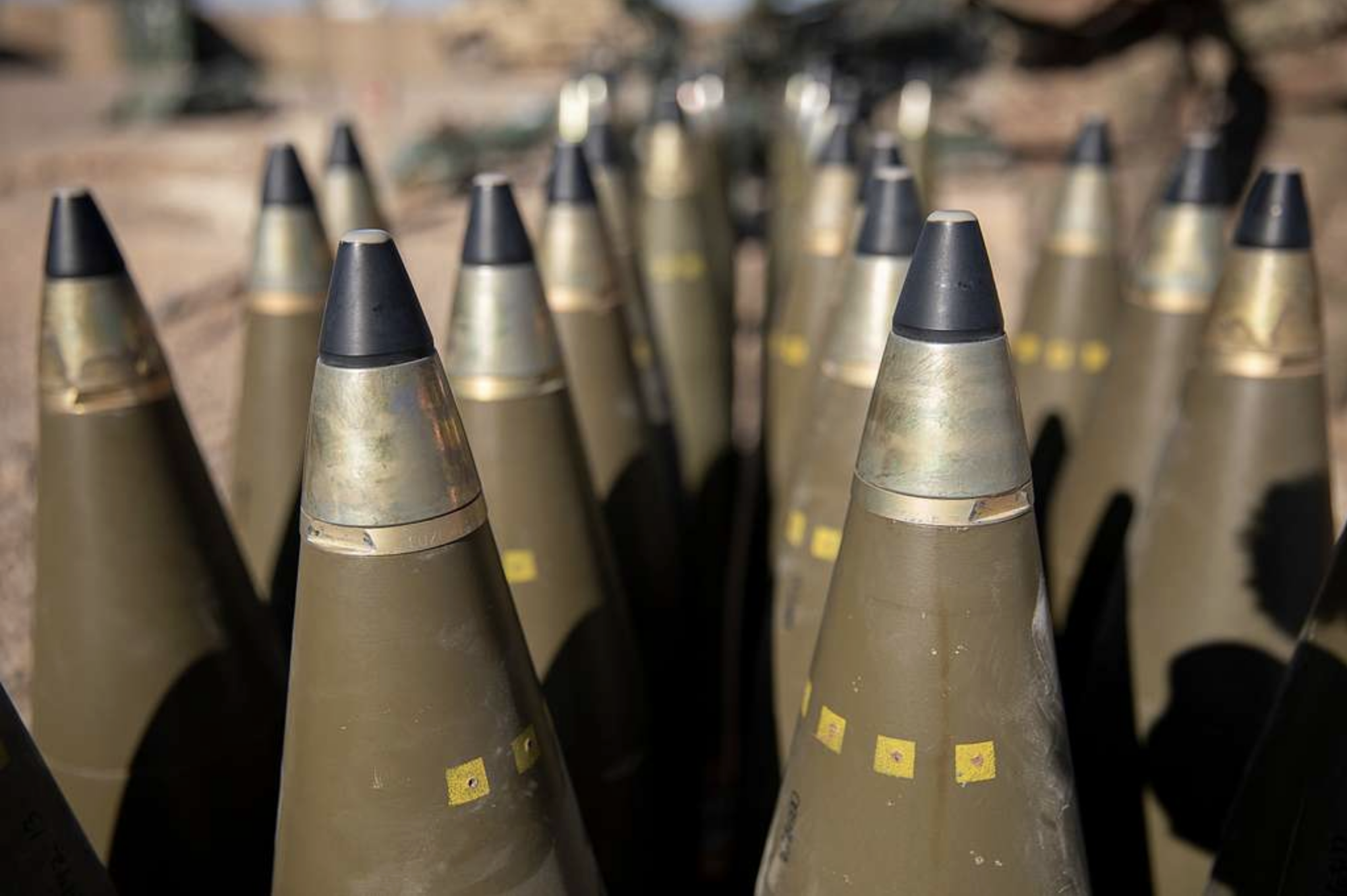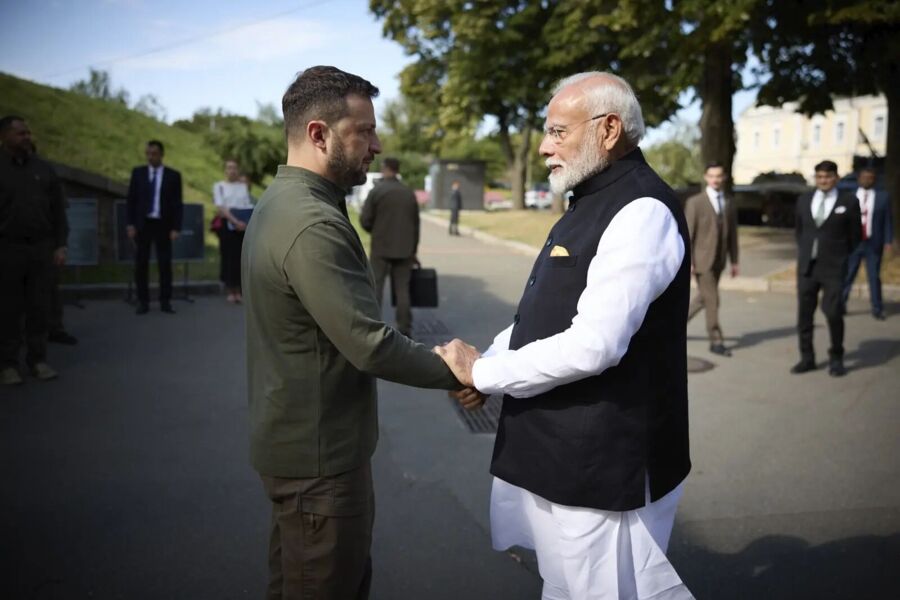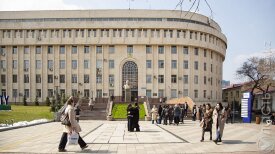This article first appeared in the Italian investigative outlet Altraeconomia. We publish here an edited version with permission.
An Italian company imported around 200,000 cannon shells from India, then shipped them – with permission from the Italian government – to Slovakia and, ultimately, to Ukraine. This scheme marks an unofficial addition to the military aid that two consecutive Italian governments have extended to Kyiv.
There are two ways in which the Italian government is helping the Ukrainian side in its struggle against Russia’s aggression which began with the February 2022 invasion. First, there have been formal agreements between the two governments, subject to nine decrees signed by former Prime Minister Mario Draghi and his successor Giorgia Meloni. The contents and value of these military donations remain classified.
Second, Italy has facilitated the export of military equipment to Ukraine through government-issued export licenses for private companies. According to official data, in 2023 Italian companies exported military goods worth around €69.5 million, although they were granted licenses for up to €417 million, a record amount.
Italian investigative outlet Altraeconomia and OPAL (Observatory on Light Weapons in Brescia) revealed details behind an opaque third channel through which an Italian company, with the consent of the government, is sending substantial military supplies to Ukraine.
MES Spa, an Italian company, was at the center of a Reuters investigation in September, which exposed its role in sourcing and supplying weapons and artillery from India. Most notably, MES first bought from India and then sold to Slovakia around €100 million worth of 155 mm howitzer rounds, which were later sold to Ukraine.
Italian (In)Transparency
By law, the Italian government must send to Parliament every year an account of import, export, and transit of military materials. The latest one for 2023 spans over 2,000 pages and includes attachments from several ministries and government agencies (from the ministry of foreign affairs to the customs authority). While detailed, the report does not include the specific classification of the weapons and ammunition involved in the trade.
Some hints included in the latest report, however, became crucial data points for understanding the entire trade chain. First, Italy authorized exports for a record value in two key military categories: €897 million for “munitions” (including howitzer, mortar, and field gun rounds) and €1.1 billion for “bombs” (including torpedoes and rockets).
Second, Italy’s imports from India of military supplies skyrocketed in 2023 to €111 million, compared to a few million euros annually in previous years. India, one of the world’s largest importers of military equipment, mostly sources its supplies from Russia and France, according to the latest report from the Stockholm International Peace Research Institute (SIPRI).
But there is one particular company that has gained from an import-export scheme in the conflict in Ukraine. Before 2022, MES, the Rome-based company, held export licenses for up to €7.5 million and minimal import licenses. In 2022-2023, however, it was granted permission to import and export military supplies worth several hundred million euros.
The value of the goods that MES put to market more than doubled in 2022 to €77.3 million, compared to the previous year. In 2023, the trend continued, as output doubled again to €144.6 million. Revenues also soared from €7.3 million in 2021 to €32 million in 2023.
On August 25, 2022, as Draghi was leaving office ahead of Parliamentary elections, the Department for Arms Control (UAMA in its Italian acronym) authorized MES to export up to 125,000 empty or partially empty 155 mm howitzer rounds. According to customs data, MES only exported 18,215 units, to Slovakia (57%) and to Spain (43%).
The quantity of authorized 155 mm rounds represented 93% of the value of the licenses that the Italian government had granted to MES in 2022.
The following year, the Italian government approved even more consistent licenses for MES. It was authorized to sell 385,124 155 mm rounds, more than three times than the year before. MES was also able to obtain a license to import 212,714 rounds, of which it effectively imported 131,618 units.
This time, however, MES was able to export larger quantities: it sold 178,431 rounds (of which 111,113 empty shells) abroad, almost ten times more than the previous year.
Essentially, as explained in the investigation, MES functioned as a hub through which ammunition was traded from India to Slovakia, and further to Ukraine.
Bullet Journal
India became the fourth-largest exporter of military supplies to Italy in 2023, according to official statistics. In 2023, overall, Italy imported military supplies from India worth exactly €44,238,232.25. This is also the same value that MES reported having imported the same year when it bought 155 mm rounds in three separate instances.
According to the investigation, this means that MES was the destination of the entirety of India’s exports of military supplies to Italy in 2023.
For 155 mm rounds exported from Italy, according to the latest government data from 2023, the destination was Slovakia.
In one case, in which data is fully available, MES bought 100,050 empty 155 mm shells for €29.4 million and sold 79,530 of them to Slovakia for €27.8 million, a 19% markup on the unit price paid to India.
Without importing these projectiles from India, MES would not have in storage the quantities it would need to fulfill the orders from Slovakia.
Interestingly, MES had already requested a license to export 155 mm rounds to Slovakia before having obtained a license to import the same items from India. Was this a strategy of the company or was the Italian regulator aware of the link between the two trade routes? Were India and the Italian regulator aware that the ultimate beneficiary of the rounds would be the Ukrainian military?
The investigation goes to great lengths to describe in detail the exact trade dynamics between Italy and Slovakia, listing the various licenses that the government granted to MES and the accounting of the sale of empty shells to Slovakia.
Despite minor accounting discrepancies between official statistics bureaus in Italy and Slovakia, it seems clear that the military trade between the two countries centered essentially around the 155 mm rounds that Italy had imported from India.
Slovak Connection
Robert Fico, Slovakia’s Prime Minister, campaigned ahead of the 2023 elections under the slogan that his government would “not send a single ammunition round” to Ukraine any longer.
Yet, in several investigations, Reuters, Altraeconomia, and the Slovak Spektator, all found that Fico’s government had sold ammunition worth at least €112 million since he took office.
While detailed statistics on Slovakia’s arms exports to Ukraine for 2022 and 2023 are classified, according to the UN Comtrade database, Slovakia sold €186 million worth of bombs and ammunition under the HS 9306 classification (Bombs, grenades, torpedos, mines, missiles, cartridges and other ammunition and projectiles) to Ukraine in 2022 and €121 million in 2023. As shown in Altraeconomia’s investigation, it would be impossible for Slovakia to supply such quantities of weapons and rounds without buying them from Italy first.
And this is a breach of Italian law, according to which export licenses should include the ultimate user of the weapons and ammunition to be sold. That Ukraine was the ultimate user was never disclosed to Parliament.
The Russia-India Relationship
In December 2023, videos circulating on social media showed 155 mm rounds, allegedly of Indian origin, loaded onto howitzers that Poland had donated to Ukraine. While the videos were later removed and the Ukrainian military did not confirm the origin of the projectiles, this led to a diplomatic row with Russia.
India has always kept a neutral position towards Russia’s war in Ukraine and categorically denied that ammunition from India was sent to Ukraine. Now, the Indian government is investigating the involvement of a third country in the trade, which could look like the triangulation described in the Altraeconomia investigation.
Since the start of the war, India has increased its trade with Russia, especially in terms of oil imports. In July 2024, Indian Prime Minister Narendra Modi hugged Russia’s President Vladimir Putin in Moscow, but then also flew to Kyiv the following month to offer support to Volodymyr Zelenskyy.
In September, India’s ministry of foreign affairs officially stated that the Reuters investigation was “speculative and misleading” as well as “inaccurate and mischievous.”
The lack of transparency in India’s official statistics concerning arms sales renders it necessary for observers to cross-reference a multitude of international databases to verify the information.
And this is an example that could also be followed by the Italian government, the piece by Altraeconomia argued. Giorgia Meloni’s cabinet, in fact, proposed to make the reporting on arms trade more general and vague, in an effort to safeguard “national security.”
“If the amendments [...] were to be approved, it would be impossible for independent research centers and media outlets to trace individual transactions that the government authorizes for the export of defense supplies.”
On October 22, during a BRICS meeting in Kazan, in Russia’s Volga region, Modi reiterated his call for a “quick” peace, saying that “disputes should only be resolved peacefully.”
The article published at Altraeconomia was authored by Giorgio Beretta, Duccio Facchini, and Maria Tavernini. This is an edited, shortened, and updated translation.
Поддержите журналистику, которой доверяют.
